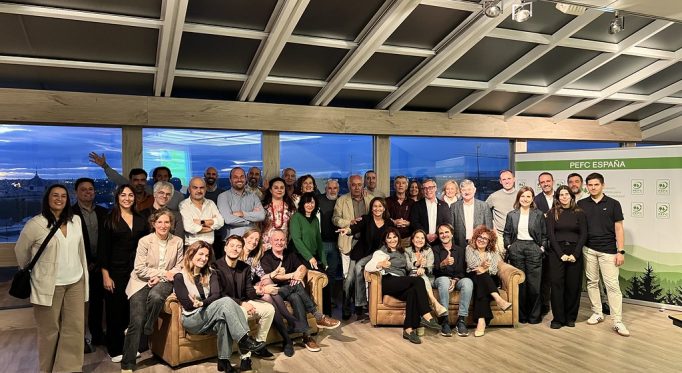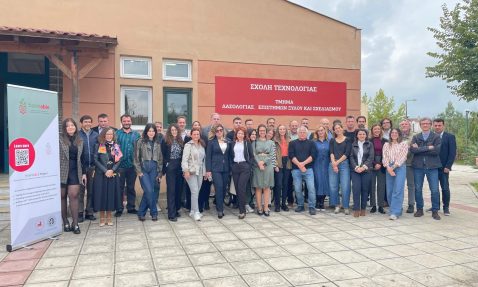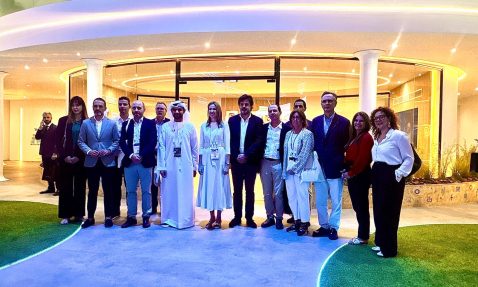CETEM participates in the PEFC Dialogue Forum ‘Forests of the future: society and active management for a resilient territory’
CETEM participates in the PEFC Dialogue Forum ‘Forests of the future: society and active management for a resilient territory’

On Friday 24 October, to mark International Climate Change Day, a new edition of the PEFC Dialogue Forum was held at the Bertelsmann Space in Madrid, under the slogan ‘Forests of the future: society and active management for a resilient territory’. This meeting brought together representatives from public administrations, the forestry sector, science, business, the media and culture, with the aim of reflecting on how to anticipate the effects of climate change through active and sustainable forest management.
The event was opened by Francisco Carreño, president of PEFC Spain, who emphasised the importance of public-private collaboration in advancing sustainability and revitalising rural areas: ‘Only with collective will and commitment will we achieve vibrant and resilient rural development,’ he said. For her part, Ana Belén Noriega, Director General of PEFC Spain, highlighted that the forum aimed to ‘explore how forest management, governance and social involvement can anticipate the effects of climate change and how emergency prevention protects ecosystems,’ in a context that requires cooperation between all stakeholders.
Block 1, entitled ‘Before the emergency: strategic decisions and vision for the future’, addressed the challenges of forest planning and management for emergency prevention. Panel 1, moderated by Flor Álvarez, professor at the University of León, featured José Luis Chan, Director General of Forest Planning and Management for the Regional Government of Galicia; Luis Gomis, Director General of the Environment and Animal Welfare for the Regional Government of Valencia; Ana Oliván, Director General of Forest Management for the Regional Government of Aragon; and Patricia Gómez, Manager of COSE. The speakers agreed that effective prevention requires active management, planning at the territorial level and close cooperation between the public and private sectors.
Table 2, entitled ‘Investments and policies that generate resilience’ and moderated by Miguel Ángel Duralde, president of ASEMFO, featured Irene Aguiló, director general of Biodiversity and Forest Management for the Community of Madrid; María Cruz Ferreira, Regional Secretary for Energy, Sustainability and Climate Action of the Government of the Region of Murcia; and Susana Jara, Director General of Natural Environment and Biodiversity of the Regional Government of Castile-La Mancha. The speakers defended the need for stable planning, sustained investment and policy coherence to strengthen the rural bioeconomy, promote forestry associations and guarantee mixed financing to ensure the continuity of actions in the territory.
Block 2, entitled ‘Collaboration and action from the territory. From knowledge to action: innovation and forest management networks connecting territory, science and the business fabric’, brought together experts from the fields of research, industry and technology transfer. Participants included Pablo Sabín, director of CESEFOR; Francesc Cano, deputy director of transfer at CTFC; Enrique Valero, president of PEFC Galicia and director of the AF-4 research group at the University of Vigo; Arantza Pérez, forestry director at ASPAPEL; and Oskar Azkarate, general director of Baskegur and representative of PEFC Euskadi. The round table was moderated by Lola Martínez, equality editor at RNE and director of the RadioActivas programme. This section emphasised the need to strengthen the link between science, technology and society in order to anticipate trends and promote modern forest management based on data and geared towards innovation and sustainability.
Block 3, entitled “Connecting forests and society. Art, culture and communication as drivers of change,‘ featured María Lafuente, designer and ambassador for the PEFC international campaign ’Fashions Change, Forests Stay”; Zenet, singer, actor and visual artist; and Rosa Ana Rodríguez, project director at the Unidad Editorial School, moderated by María José Celada, presenter of the HazteEco programme on NEOX. The speakers agreed that art, culture and communication are essential tools for connecting citizens with forests, raising environmental awareness and promoting a shift in values towards sustainability.
The forum also hosted the 79th Board Meeting of PEFC Spain, attended by 28 representatives from member organisations. CETEM was represented by its director, José Francisco Puche, who actively participated in the meeting, where the progress of the 2023-2026 Strategic Plan was presented. During the meeting, the growth of forest certification in Spain was highlighted, reaching 2,997,325 hectares certified under the PEFC system and 81,650 active foresters, representing a 12% increase in certified area and a 45% increase in new members since the start of the plan.
By participating in this forum, CETEM reaffirms its commitment to sustainability, the circular economy and responsible management of natural resources. The organisation considers cooperation between science, business and government to be essential in promoting a resilient and sustainable rural development model, in line with the Sustainable Development Goals and the ecological transition.













